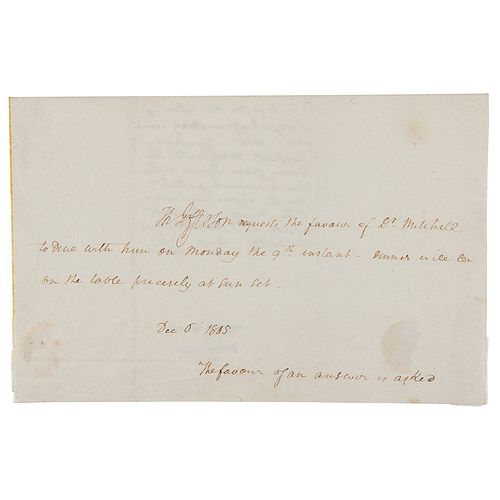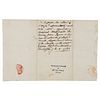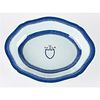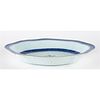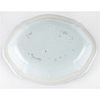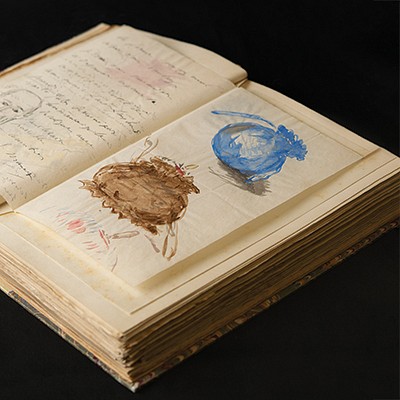Thomas Jefferson Signed 1805 Invitation and Rare 'J' Armorial Serving Bowl
Two ways to bid:
- Leave a max absentee bid and the platform will bid on your behalf up to your maximum bid during the live auction.
- Bid live during the auction and your bids will be submitted real-time to the auctioneer.
Bid Increments
| Price | Bid Increment |
|---|---|
| $0 | $5 |
| $50 | $10 |
| $200 | $25 |
| $500 | $50 |
About Auction
Jun 14, 2023
RR Auction's June Fine Autographs and Artifacts sale boasts over 900 lots, highlighted by a special animation section of 200+ pieces of original production drawings, animation cels, and concept paintings from Disney classics like Snow White, Cinderella, and Alice in Wonderland. = RR Auction support@rrauction.com
- Lot Description
Exquisite pairing of a signed 1805 dinner invitation from Thomas Jefferson and an extremely rare exported fine china armorial ‘J’ serving bowl deriving from the personal collection of Thomas Jefferson Coolidge, the great-grandson of Thomas Jefferson. The invitation, one page, 7.75 x 5, December 6, 1805, is signed by Jefferson, “Th: Jefferson,” but filled out in his secretary's hand, and reads: “Th: Jefferson requests the favour of Dr. Mitchell to dine with him on Monday the 9th instant. Dinner will be on the table precisely at sun set. Dec 6: 1805. The favour of an answer is asked.” The reverse is endorsed by another hand, confirming Mitchell’s same-day agreement and noting the additional company of “Mellimelli the Envoy from Tunis & his two secretaries & Mess’rs Smith, Logan and Adams of the Senate, with Mess’rs Eppes, T. J. Randolph & Nicholson, of the H. of R." Also present to the reverse a stamp identifying the piece as from the autograph collection of the renowned surgeon and collector Dr. Max Thorek of Chicago.
The oval scallop-edged porcelain serving bowl, 12″ x 9.25″ x 1.75″, features hand-painted double-banded cobalt borders, and the center bears an exceptional design featuring Jefferson's neoclassical shield studded with 13 gold stars enclosing the script initial "J," surmounted by a plumed knight's helmet. A very unusual piece of china and the only example we have seen in this style. In overall fine condition.
The serving bowl derives from the Brick House at Coolidge Point, Manchester-by-the-Sea, Massachusetts, the family resident of Jefferson’s great-grandson, Thomas Jefferson Coolidge (1831-1920). The property was also famously home to the Marble Palace, designed by Charles F. McKim of McKim, Mead & White, known for its massive Ionic columns that referenced Jefferson’s Monticello. The Marble Palace was demolished in 1958, and many of the furnishings were moved to the Brick House and are now presented in the auction. Among the contents of the Brick House were found various items that belonged to our third president, and this magnificent piece of armorial porcelain is one of them. The storied circa 1790 Chinese export “J” dinner service has long been associated with Thomas Jefferson. It is included in Margaret Brown Klapthor’s Official White House China (1984) and has been on display as Jefferson’s service at Monticello, the White House, and other U.S. State Department facilities.
The mention of “Mellimelli” on the reverse of the invitation is quite significant. Sidi Soliman Mellimelli was a Muslim ambassador from Tunisia, who traveled to the United States in 1805 as part of an effort to negotiate an end to the ongoing conflict between the two nations, which had erupted into what is now known as the First Barbary War. He arrived in the United States in April of 1805 and was received with much curiosity and fanfare by the American public, who were fascinated by his exotic dress and customs. He met with President Thomas Jefferson in Washington during Ramadan, a month-long period in which Muslims fast from sunrise to sunset. To accommodate his guest's religious obligation, Jefferson's invitation to the President's House on December 9th changed the time of dinner from the usual ‘half after three’ to "precisely at sun set." Mellimelli's trip to America is notable for being one of the first instances of diplomatic contact between the United States and a Muslim nation, and for highlighting the complex political and cultural dynamics at play in the early years of the American republic. - Shipping Info
-
Bidder is liable for shipping and handling and providing accurate information as to shipping or delivery locations and arranging for such. RR Auction is unable to combine purchases from other auctions or affiliates into one package for shipping purposes. Lots won will be shipped in a commercially reasonable time after payment in good funds for the merchandise and the shipping fees are received or credit extended, except when third-party shipment occurs. Bidder agrees that service and handling charges related to shipping items which are not pre-paid may be charged to a credit card on file with RR Auction. Successful international Bidders shall provide written shipping instructions, including specified Customs declarations, to RR Auction for any lots to be delivered outside of the United States. NOTE: Declaration value shall be the item’(s) hammer price and RR Auction shall use the correct harmonized code for the lot. Domestic Bidders on lots designated for third-party shipment must designate the common carrier, accept risk of loss, and prepay shipping costs.
-
- Buyer's Premium



 EUR
EUR CAD
CAD AUD
AUD GBP
GBP MXN
MXN HKD
HKD CNY
CNY MYR
MYR SEK
SEK SGD
SGD CHF
CHF THB
THB